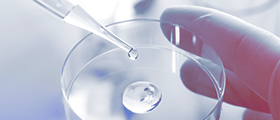SKC
-
CCorporation
 A leading company that strive for the world’s best.
A leading company that strive for the world’s best.
-
CCreation
 Global ESG material solutions company
Global ESG material solutions company
-
CCommunication
 SKC is making efforts to create a better future for all of our partners.
SKC is making efforts to create a better future for all of our partners.
-
CCareer
 SKC is making efforts to create a better future for all of our partners.
SKC is making efforts to create a better future for all of our partners.
● SKC Tech Day 2023 was held on November 9 at SKC headquarters in Jongno-gu, Seoul.… Sharing technological roadmaps for core and new businesses
● Showcasing super gap technologies, including future EV battery anode current collectors, rubber sockets for semiconductor testing, and biodegradable nonwovens
● Highlighting competitive patent assets for each business… 230 copper foil patents, the largest patent network in the industry.
SKC (CEO & President Woncheol Park) held SKC Tech Day 2023 on November 9 at its headquarters in Jongno-gu, Seoul, and unveiled technology blueprints for core and new businesses. SKC Tech Day is an event where SKC shares its research and development status and technology roadmaps with the market.
SKC introduced various new technologies at SKC Tech Day 2023, including silicon anode materials, semiconductor glass substrates, and eco-friendly biodegradable materials together with copper foil for EV batteries, which has become SKC’s core business. Additionally, SKC’s recently acquired ISC debuted its semiconductor test solution technology at Tech Day.
Regarding the EV battery materials business, where SKC has the top global competitiveness in technology, the company shared the achievements in developing copper foil for the 4680 cylindrical battery and R&D directions for anode collectors to be used in future EV batteries, such as all-solid-state batteries. Jung-kyu Ahn, Chief of SK nexilis Materials Technology Development Center, explained, “We are developing customer solutions having properties required by future EV battery anode current collectors, such as high strength, high elongation, high heat resistance, and corrosion inhibition.”
The current status of patent assets related to copper foil was also shared at Tech Day. As of March of this year, SK nexilis had the most extensive patent network in the industry, with 230 applications. Cooper foil requires advanced manufacturing technology in that it significantly influences the productivity of EV battery manufacturers, not to mention the performance of EV batteries. SK nexilis produces top-quality copper foil based on technology accumulated through continuous research and development.
Next came the introduction of silicon anode materials' technological competitiveness, which is considered a critical future element to feed on in the EV battery materials field along with copper foil. This year, SKC established a subsidiary, Ultimus, and plans to start pilot production in January next year by utilizing technology of UK-based tech company Nexeon, of which SKC became the largest shareholder through equity investment in January last year.
In the semiconductor materials/components sector, glass substrates for high-performance computing and ISC’s semiconductor test solution technology were showcased. Absolics Inc., an invested subsidiary of SKC in the copper foil business, will complete the world’s first mass production facility at the end of this year. SKC also shared the company’s preparation for smart factory-based mass production, patent application status, and where the company is headed for next-generation product development, including AI Learning Accelerator with the expanded application of element embedding technology.
ISC, which newly became a subsidiary of SKC this year, highlighted its excellent competitiveness in the market for rubber sockets, a key component for semiconductor testing. ISC succeeded in mass-producing rubber sockets for the first time in the world in 2003. It is considered to have secured a technological gap of more than ten years compared to latecomer competitors. Like SK nexilis, ISC has built the largest patent network in the industry, with 578 patents related to test sockets. ISC’s clients include over 300 global companies, including memory/non-memory semiconductor makers, fabless semiconductor companies, and big techs with large-scale servers.
SKC also shared information on the eco-friendly biodegradable materials business, the company’s third growth engine, along with EV battery materials and semiconductor materials/components, introducing technological competence and commercialization efforts in progress for high-strength PBAT and biodegradable LIMEX materials. It was particularly underlined that 100% PBAT non-woven fabric, the first of its kind in the world developed by SKC, can potentially expand the market into hygiene products, wet wipes, and more, for which biodegradable materials have not previously been used.
An SKC executive stated, “Based on the original technology secured through decades of continuous research and development, we are growing into a company with a technological moat that no other player can easily overcome,” and added, “We will actively also continue to communicate SKC’s technology roadmaps for the future market.” [End]
